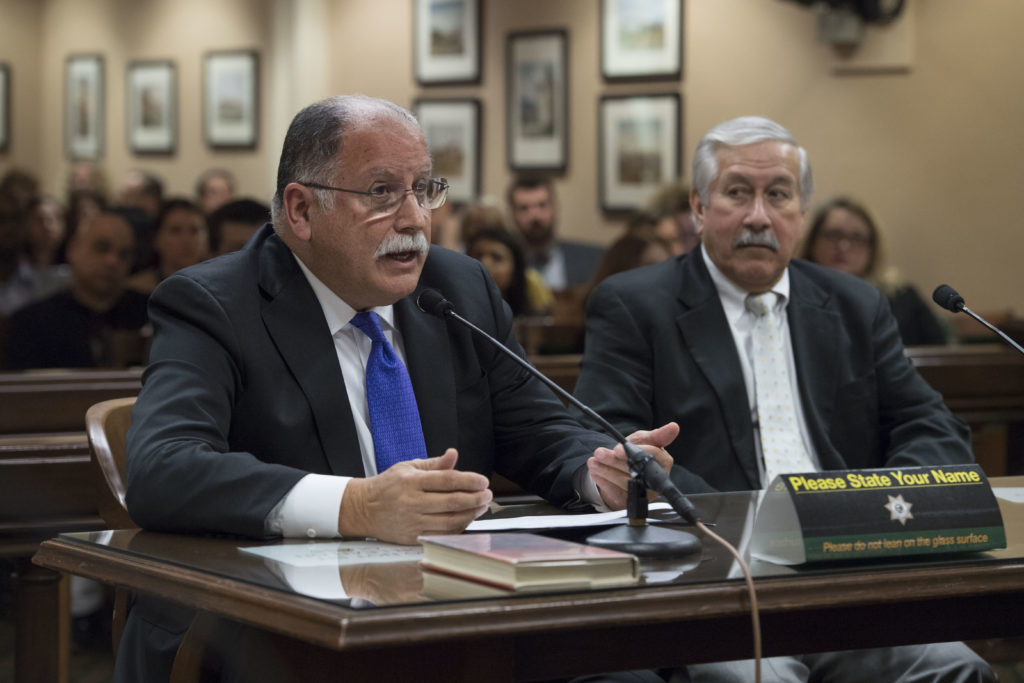
Black teachers: How to recruit them and make them stay

Lessons in higher education: What California can learn

Keeping California public university options open

Superintendents: Well-paid and walking away

The debt to degree connection

College in prison: How earning a degree can lead to a new life

Assemblyman Jose Medina, who chairs the Assembly’s Committee on Higher Education, recently announced he would not seek re-election in 2022.
Medina, a Riverside Democrat, was first elected in 2012 to represent the 61st district. Before entering the Legislature, he worked as a Spanish and Chicano studies teacher at Riverside’s Poly High School and taught history at San Bernardino Valley Community College.
Medina sat down with EdSource for an interview about his legislative career and what his priorities are for higher education funding in the year ahead.
The following has been edited for length and clarity.
You’ve chaired the Higher Education Committee for the past seven years. How has higher education changed since you first entered the Assembly?
Unfortunately, it sounds like it has become more difficult to be a college student as of late. Certainly, going way back to when I was a college student … issues like housing instability were unheard of before. It’s a little more difficult to be a college student right now and especially during the pandemic.
I do support (Assemblyman Kevin) McCarty’s asking for more money for housing.
(McCarty, a Sacramento Democrat who chairs the Assembly Budget Subcommittee on Education Finance, recently said he would request $5 billion next year to create more housing options for the University of California and California State University students.)
It’s something that I’ve become very aware of across all segments of higher education. As I visited colleges, places like UC San Diego, and within the CSU at places like Cal State Fullerton, and as I talked to community college presidents, they all tell me how much they need more housing. So, yes, I would support Assemblyman McCarty, and I hope to be a co-author on the bill with him.
What other priorities would you like to tackle when the Legislature returns next year?
Cal Grant reform is still a top priority of mine. I recently met with the folks at the California Student Aid Commission and the president of San Diego State, and they’re all in agreement that we still need to simplify that process, especially for the community college students.
You know, it’s not just tuition that is the stumbling block. I was a trustee for many years in a community college. I know that if students have to work to support themselves, they’re not able to concentrate on what our students should be concentrating on, and that is their classes. But that’s not the case right now.
(In October, Gov. Gavin Newsom vetoed legislation that would have overhauled the Cal Grant, which is the state’s main financial aid program. Newsom’s administration had opposed the bill, calling it too expensive.)
Cal Grant reform is at the top of that list of something that I pushed for, and I’m disappointed it hasn’t made it yet. So, it will be a very high priority for me.
And I will continue to look very critically at Calbright College. I am planning to introduce a bill once again to eliminate Calbright and refund that money elsewhere in higher education.
(Calbright College is California’s online-only community college that awards career certificates, not degrees. But the college has been criticized since it opened in October 2019 for poor management and graduating too few students. The Assembly unanimously voted in May to shut down the college, but the bill never appeared in the Senate for hearing.)
I called for an audit of Calbright, and I still think it’s a bad use of the state’s resources. I don’t disagree with their mission, but I have said that the community colleges themselves would be able to do that same mission and education for those students who have fallen through the gaps. It’s not a bad mission, but the way it’s been structured hasn’t worked, and we’re beyond time to pull the plug and reallocate that money.
Is there any legislation that you are especially proud of having passed during your time in the Assembly?
Certainly. My ethnic studies bill that I worked on for three years and was vetoed twice is a bill of mine that I’m perhaps most proud of. It took a lot of work, and I think it will have a significant impact on the students of California in the years ahead.
(Medina authored Assembly Bill 101, which was finally signed by Newsom in October and makes California the first state in the country to require all students to complete a semester-long course in ethnic studies to earn a high school diploma.)
I’m also proud of AB 927 which expands the opportunity for community colleges to grant four-year degrees.
I have had my name on the ballot almost continuously since 1989 when I first ran for a school board locally. So I’m looking forward to slowing down and not running for office. But I do hope to be involved, in some capacity, in education even when I leave.

Part-time instructors, many who work for decades off the tenure track and at a lower pay rate, have been called “apprentices to nowhere.”

A bill to mandate use of the method will not advance in the Legislature this year in the face of teachers union opposition.

Nearly a third of the 930 districts statewide that reported data had a higher rate of chronic absenteeism in 2022-23 than the year before.

The move puts the fate of AB 2222 in question, but supporters insist that there is room to negotiate changes that can help tackle the state’s literacy crisis.
Comments
Comments Policy
We welcome your comments. All comments are moderated for civility, relevance and other considerations. Click here for EdSource's Comments Policy.